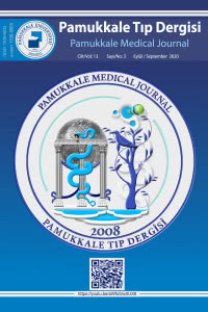Dil ve konuşma terapisi öğrencilerinin gözünden aile merkezli hizmet
Dil ve konuşma terapisi, çocuk sağlığı hizmeti, aile merkezli hizmet, aile merkezli uygulamalar
Viewpoints of speech and language therapy students on family-centered service
Speech and language therapy, child health care, family-centered service, family-centered practices,
___
- 1. Institute for Patient- and Family-Centered Care. [cited 2019 02/28/2019]. Available from: http://www.ipfcc.org/about/pfcc.html.
- 2. Patient- and family-centered care and the pediatrician's role. Pediatrics. 2012;129(2):394-404.
- 3. Kuhlthau KA, Bloom S, Van Cleave J, Knapp AA, Romm D, Klatka K, et al. Evidence for family-centered care for children with special health care needs: a systematic review. Academic pediatrics. 2011;11(2):136-43.
- 4. Raghavendra P, Murchland S, Bentley M, Wake-Dyster W, Lyons T. Parents' and service providers' perceptions of family-centred practice in a community-based, paediatric disability service in Australia. Child: care, health and development. 2007;33(5):586-92.
- 5. Hanna K, Rodger S. Towards family‐centred practice in paediatric occupational therapy: A review of the literature on parent–therapist collaboration. Australian Occupational Therapy Journal. 2002;49(1):14-24.
- 6. Crais ER, Roy VP, Free K. Parents' and professionals' perceptions of the implementation of family-centered practices in child assessments. American journal of speech-language pathology. 2006;15(4):365-77.
- 7. McCormack J, McLeod S, Harrison LJ, McAllister L. The impact of speech impairment in early childhood: investigating parents' and speech-language pathologists' perspectives using the ICF-CY. Journal of communication disorders. 2010;43(5):378-96.
- 8. Pappas NW, McLeod S, McAllister L, McKinnon DH. Parental involvement in speech intervention: A national survey. Clinical Linguistics & Phonetics. 2008;22(4-5):335-44.
- 9. Al-Motlaq MA, Shields L. Family-Centered Care As a Western-Centric Model in Developing Countries. Holistic nursing practice. 2017;31(5):343-7.
- 10. Shields L, Çavuşoğlu H, Pars H, Mamun AA. Measuring family-centred care: working with children and their parents in a Turkish hospital. European Journal for Person Centered Healthcare. 2015;3(3):327-33.
- 11. Craft-Rosenberg M, Kelley P, Schnoll L. Family-centered care: Practice and preparation. Families in Society. 2006;87(1):17-25.
- 12. Murray MM, Mandell CJ. Evaluation of a family-centered early childhood special education preservice model by program graduates. Topics in Early Childhood Special Education. 2004;24(4):238-49.
- 13. Case-Smith J, Sainato D, McQuaid J, Deubler D, Gottesman M, Taber M. IMPACTS project: Preparing therapists to provide best practice early intervention services. Physical & occupational therapy in pediatrics. 2007;27(3):73-90.
- 14. Scarinci N, Rose T, Cronan A, Lambertz K. Speech pathology student experiences and perceptions of working with parents in a Hanen It Takes Two to Talk family-centred clinical placement. Speech, Language and Hearing. 2018;21(3):132-41. 15. Zengin Akkus P, Ilter Bahadur E, Coskun A, Koken G, Karahan S, Ozmert EN. Family‐centred service: Perspectives of paediatric residents from a non‐Western country. Child: care, health and development. 2020.
- 16. Woodside JM, Rosenbaum PL, King SM, King GA. Family-centered service: developing and validating a self-assessment tool for pediatric service providers. Children's health care. 2001;30(3):237-52.
- 17. Family-centered care and the pediatrician's role. Pediatrics. 2003;112(3 Pt 1):691-7.
- 18. Kang LJ, Palisano RJ, Simeonsson RJ, Hwang AW. Measuring family-centred practices of professionals in early intervention services in Taiwan. Child: care, health and development. 2017;43(5):709-17.
- 19. Jeglinsky I, Autti-Rämö I, Brogren Carlberg E. Two sides of the mirror: parents' and service providers' view on the family-centredness of care for children with cerebral palsy. Child: care, health and development. 2012;38(1):79-86.
- 20. Dyke P, Buttigieg P, Blackmore AM, Ghose A. Use of the measure of process of care for families (MPOC-56) and service providers (MPOC-SP) to evaluate family-centred services in a paediatric disability setting. Child: care, health and development. 2006;32(2):167-76.
- 21. Jeglinsky I, Autti-Rämö I, Brogren Carlberg E. Professional background and the comprehension of family-centredness of rehabilitation for children with cerebral palsy. Child: care, health and development. 2012;38(1):70-8.
- ISSN: 1309-9833
- Yayın Aralığı: Yılda 4 Sayı
- Başlangıç: 2008
- Yayıncı: Prof.Dr.Eylem Değirmenci
Dil ve konuşma terapisi öğrencilerinin gözünden aile merkezli hizmet
Evin İLTER BAHADUR, Pınar ZENGİN AKKUŞ, Elif Nursel ÖZMERT, Tuğçe KARAHAN
Mehmet DEMİR, İsmail YAĞMUR, Eser ÖRDEK
Erkek meme kanserli hastaların analizi: tek merkez sonuçları
Sevda YILMAZ, Yeliz ARMAN KARAKAYA, Utku ÖZGEN, Ergün ERDEM, Muhammed Raşid AYKOTA
Ümit ÇABUŞ, Nazlı ÇİL, Cihan KABUKÇU
Dünya genelinde COVID-19 pandemisi yaygınlığı ile ilişkili faktörlere yönelik bir ekolojik çalışma
Ceren OĞUZ, Özgür SEVİNÇ, Erkan BARIŞ
Hemşirelik eğitiminde temel strateji: simülasyon yöntemi ile Diabetes Mellitus yönetimi
Gülcan BAKAN, Arife AZAK, Ümran ÖZDEMİR
Danış AYGÜN, Semih EKİCİ, Şahika Pınar AKYER
İntra-abdominal apselerde görüntüleme yöntemleri rehberliğinde kateterle perkütan drenaj
Mustafa AY, Gözde SONGUT, Muhammet ARSLAN, Tuğba SARI, Muhammed TEKİNHATUN, Muhammed EFE, Furkan UFUK, Halil Serdar ASLAN
